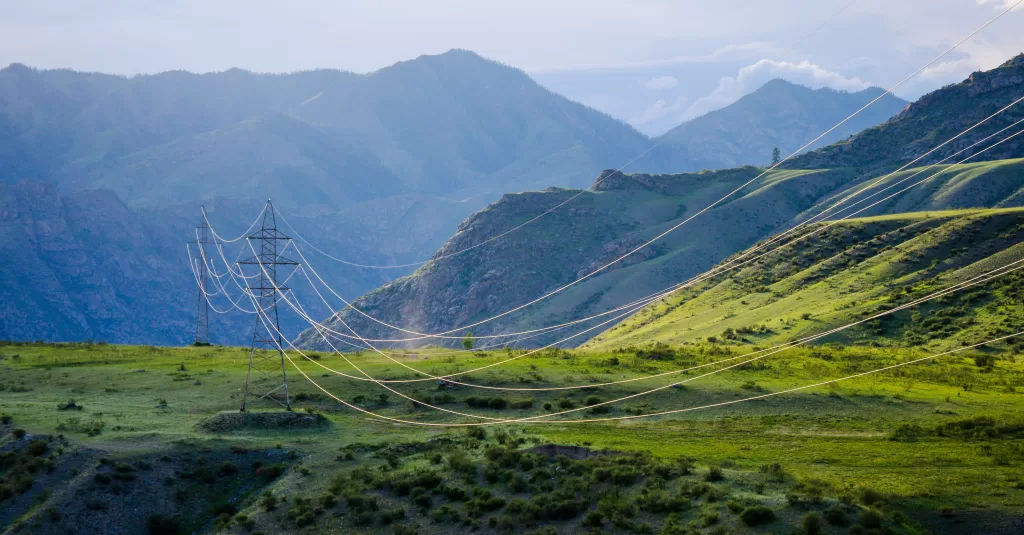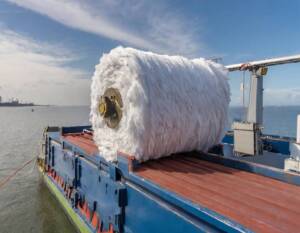Carbon fibre core high voltage cables are a remarkable innovation in the field of electrical transmission. These cables incorporate advanced materials and design to offer numerous benefits over all-metal cables. With their lightweight and tensile strength advantages, carbon fibre composite core high voltage cables are a practical next step in power transmission.
These cables use a pultruded carbon fibre core, which is wrapped in an insulating layer. Aluminium strands, either with a round or trapezoidal cross-section, are wrapped around the carbon fibre core. These aluminium strands carry the current along the length of the cable, while the carbon fibre core carries the weight of the cable.
Benefits of carbon fibre power lines
Weight
One of the key advantages of carbon fibre composite core cables is their low weight. Compared to conventional aluminium and steel cables, which can be heavy and cumbersome, carbon fibre composite core cables are significantly lighter. This weight reduction not only simplifies installation, but also reduces the load on supporting structures. It allows for longer cable spans, enabling more efficient and cost-effective transmission of electricity over long distances.
Electrical properties
In addition to their mechanical advantages, carbon fibre composite core cables exhibit excellent electrical properties. The thinner and stronger carbon fibre core allows for more aluminium conductive strands to be added to the cable. One type of carbon fibre composite core high voltage cable has almost 30% more conductive aluminium than a steel-cored cable of equal diameter and weight. So, while the core is not used as a conductor, the transmission capacity of the overall cable can be higher.
Low Sag
Another remarkable benefit of carbon fibre composite core cables is their exceptional resistance to sag. This comes from two characteristics of carbon fibre: exceptional tensile strength and low thermal expansion. Carbon fibre composites possess a higher tensile strength than steel and aluminium, allowing cables to better support their own weight, reducing the risk of sagging and allowing for longer spans between pylons.
Furthermore, carbon fibre’s low coefficient of thermal expansion means they expand and contract less with temperature changes compared to all metal cables. This characteristic is particularly important, as overhead power cables can get very hot when they are under particularly high loads, which can cause them to sag. Carbon-cored power lines will sag less when under high power loads, reducing the risk of the line shorting.
This reduced sag has made carbon fibre-cored high-voltage cables an attractive choice in applications where there is a particular risk of fire, like dry environments or ones where foliage is likely to grow close to the cables. Wildfires have been known to occur where power lines sag, so carbon-fibre cored high voltage cables are an excellent choice for reducing the risk of wildfires.
Challenges of carbon fibre in power lines
Carbon fibre composite core cables are not without their challenges. The manufacturing process for these cables requires specialized equipment and expertise, which can contribute to higher initial costs. However, as technology continues to advance and become more widespread, economies of scale should drive down the costs associated with production.
Despite these challenges, the advantages of carbon fibre composite core high voltage cables outweigh the drawbacks. Their lightweight nature, high strength, and excellent thermal properties make them a superior choice for various applications, from small scale to large scale power distribution. Additionally, their durability and reliability contribute to a more stable electrical grid and reduced environmental impact.
Carbon fibre composite core high voltage cables represent a significant advancement in the field of electrical transmission. Their lightweight, high strength, and superior electrical properties make them a great choice for many power grids. As the demand for efficient and reliable electricity transmission continues to grow, carbon fibre composite core cables will play a crucial role in meeting these needs and shaping the future of the power industry.
If you think carbon fibre may work in your project or application, please don’t hesitate to contact us at sales@sagezander.com, or +44 (0)1260 295264. Our sales team is here to answer any questions you may have.



